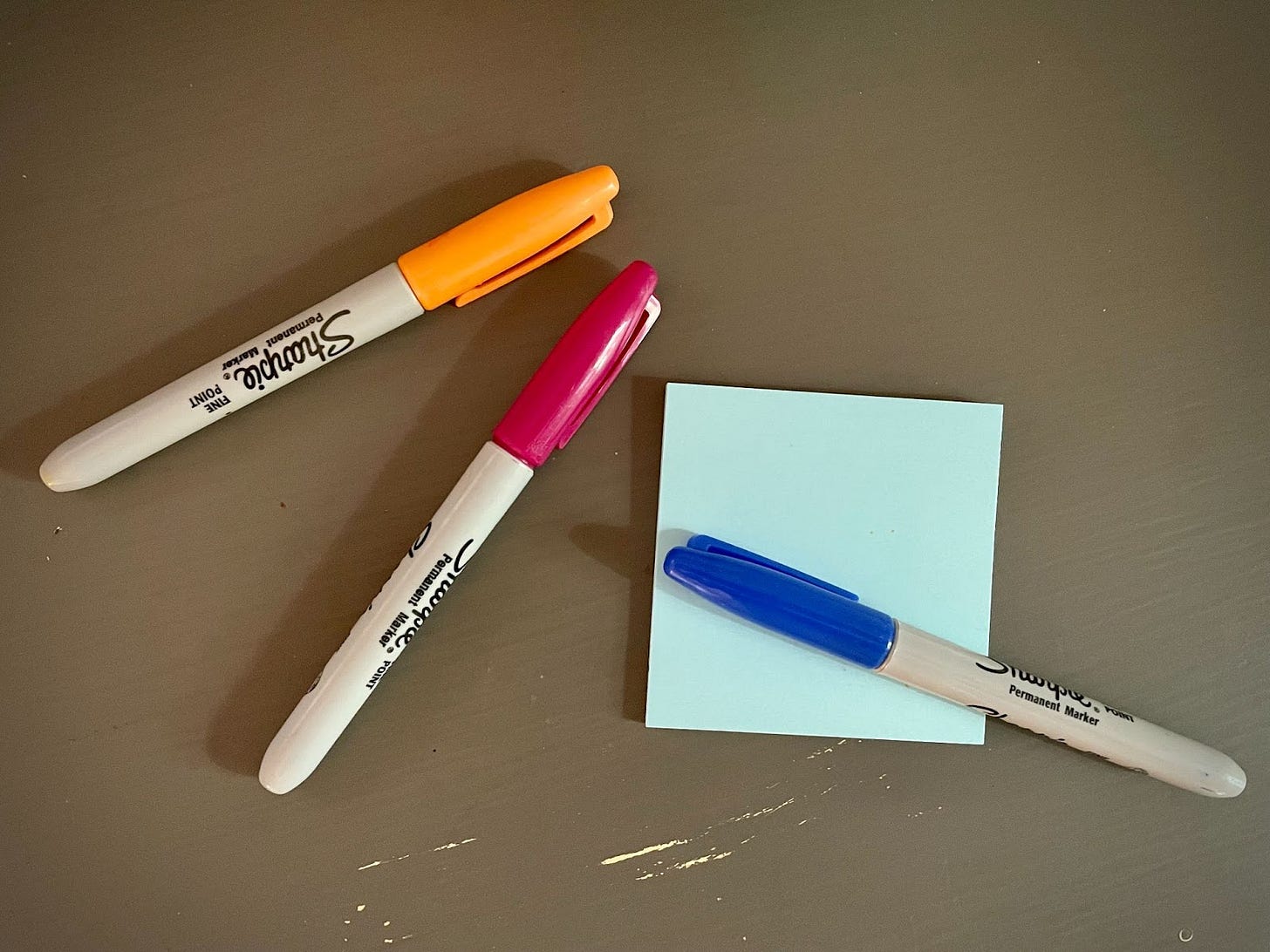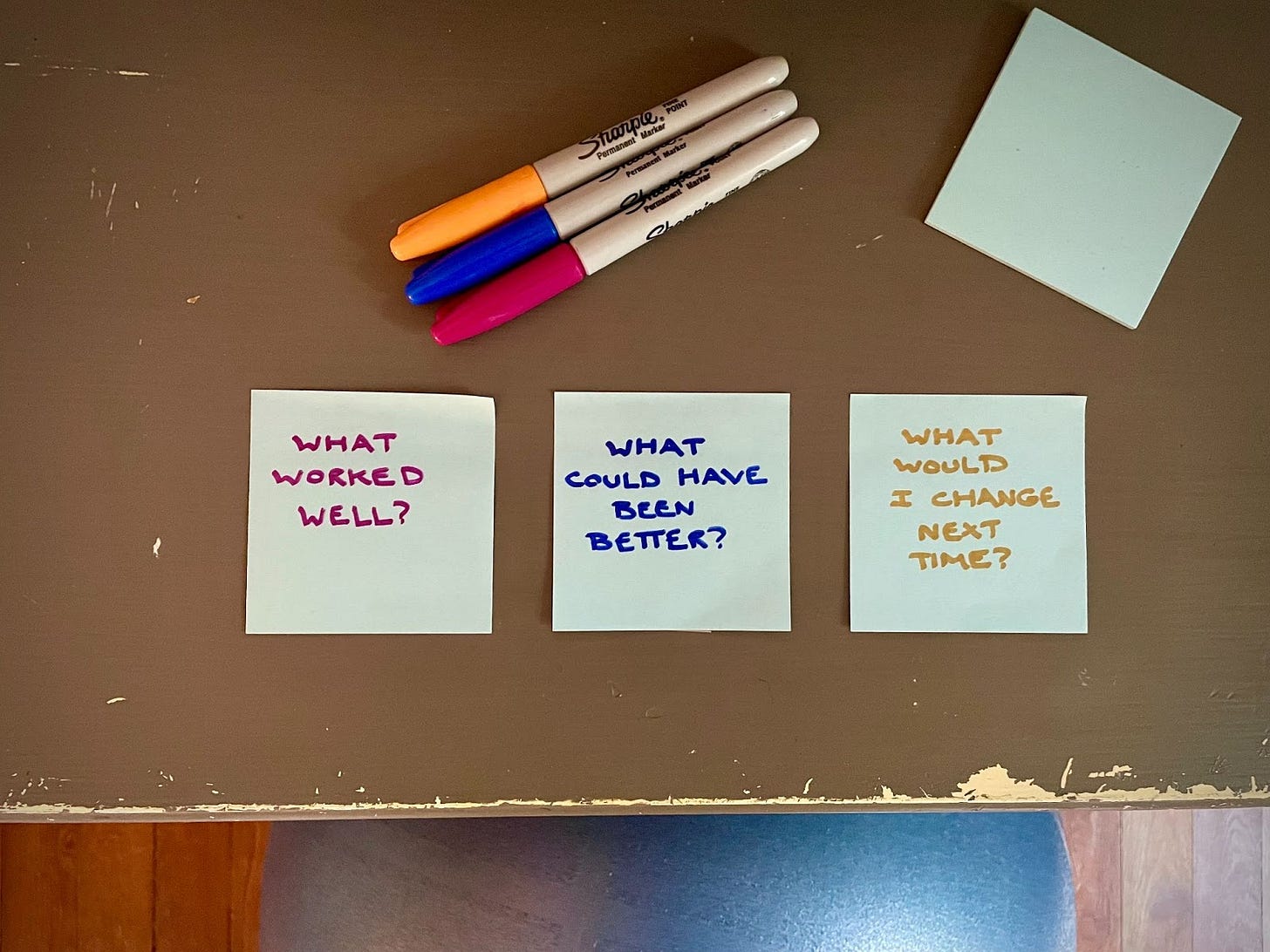Consider the pandemic post-mortem
Before jumping ahead, try reflecting on what you learned.
Sometime during the last couple of weeks, things started getting really busy. Friends came to town. Relatives extended dinner invitations. Plans were made—for next week, next month, the next long holiday weekend. Plane tickets were purchased. Hotel reservations were booked. Outfit choices were reconsidered. Somehow, without much warning at all, our calendars started filling up.
All of this busyness has been nice. I missed people! And having plans! And going places! Having people to see and places to go feels wonderfully familiar. But it’s been draining, too. As Linda Holmes put it, “Being out and seeing people again is less dramatic in the moment and more exhausting later than I expected.”
This isn’t entirely a surprise. In March, I shared my worries about rushing back to pre-COVID life. A few weeks later, I wrote about embracing my introverted side, including the fact that too much socializing tends to drain me. It makes sense that getting back into the real world, after a year and a half largely spent at home, would be somewhat overwhelming.
Perhaps the thing that feels most exhausting, though, is the sense that we all are powering ahead without pausing to take stock of what we just experienced. We learned how to adapt to a global pandemic! Doesn’t that warrant some collective reflection?
In an office setting, I am the person who beats the post-mortem meeting drum. The post-mortem meeting is pretty simple: It’s a team gathering held at the end of a project that gives everyone an opportunity to discuss wins, losses, and lessons.
Post-morts are most effective soon after a project has ended, when the team’s successes and challenges are top of mind. There are lots of different ways to approach a post-mortem—some teams bring in an outside facilitator, others send out a survey ahead of time—but the end goal is always the same: To identify better ways to work together.
I like to organize post-mortem meetings around three basic questions:
What worked well?
What could have been better?
What would we do differently next time?
If done well, a post-mortem meeting can lead to some valuable realizations. It can give everyone an opportunity to discuss past shortcomings while also thinking about ways to improve workflows in the future.
While it seems like most organizations suffer from too many meetings, post-mortem or retrospective meetings are regularly overlooked by managers. We live in a fast-paced culture, one that’s focused on the next big thing, the newest technology, the latest distraction. Taking time to pause and discuss what’s already done seems like a waste, especially in a corporate culture where time is money.
I’d argue, though, that giving teams an opportunity to reflect on past projects does help overall productivity and costs. More so, effective post-mortem meetings can boost morale, provide closure, and allow teams to learn from mistakes.
Couldn’t we all use a version of that right now?
As nerdy as it might be, post-mortem meetings are one of the things I miss most now that I’m a freelancer who largely works alone. I appreciated having a designated opportunity to reevaluate my work. Since then, I’ve discovered that it’s on me to build reflection points into my solo working schedule; otherwise, I’ll continue doing things the same way I’ve always done them.
While there’s no group to collaborate with and no outside perspectives to learn from, people who work alone can still benefit from a post-mortem to evaluate their own projects. And although post-mortems are designed for work environments, there’s no reason the same retrospective framework can’t apply to other aspects of life.
Lately, I’ve been thinking about how valuable a pandemic post-mortem would be. Of course, the pandemic is not over yet, despite how normal some bits of life may seem. That’s especially true for immunocompromised people who remain at risk, citizens in countries where vaccines aren’t as widely available, or for families with young children who can’t yet get vaccinated.
Still, considering how quickly life is speeding back up for many of us, it seems like a valuable time for reflection. I sincerely hope there are forward-thinking companies out there hosting some version of a pandemic post-mort with their employees—getting feedback on what worked well over the past year-plus and what could be improved—though that might be expecting too much.
I also believe that we could all benefit from doing this individually or with our families. Before we get too far ahead with making plans and returning to our pre-COVID routines, it would be wise to reflect on what we learned.
In this context, here are the questions to consider:
What habits and routines worked well for me over the past 15 months?
What could have been better?
If we had to go through this again, what would I do differently next time?
(I know that last question is scary, but it’s important, right? Instead of pretending like everything is fine, it’s healthy to face the fact that things can, and will, go wrong in the future.)
I decided to give this approach a whirl. Here’s a snapshot of what I discovered:
What worked well?
Over the past 15 months, I benefited from: slowing down; attending standing friend meetings on Zoom; saving more money; drinking less alcohol and caffeine; cooking at home and eating meals as a family; getting outside; establishing a shared schedule with Billy; tackling house projects and getting rid of clutter; and lowering expectations of how much I accomplish each day.
As strange and privileged as it is to admit, lockdown life wasn’t that terrible for me. I was pleasantly surprised to discover how much I enjoyed having slower days. It was great to not have to choose between spending time with my family and other obligations. I found joy in simplifying my routine and surroundings.
What could have been better?
I did not find joy in mindless scrolling, thoughtless online purchases, or unproductive arguments with Billy. I could have found better ways to deal with my stress and would have benefitted by identifying when I was stressed out earlier on. I could have gone on more outdoor adventures and wish I hadn’t prioritized work so often over my own wellbeing.
It’s important to note that this question isn’t meant to make anyone feel bad—in a work setting or otherwise. In the case of a pandemic post-mortem, it’s especially important to be gentle with yourself when reflecting on what you wish you had done. During much of the past fifteen months, we operated with limited information about what was safe and what wasn’t. We did the best that we could, in a stressful and uncharted situation. I don’t blame myself too much for my missteps, but I do wish I wouldn’t have let anxiety get the best of me. I lost a lot of time by letting my fears spiral out of control.
What would I do differently next time?
If we had to do this all over again—live through a pandemic and lockdowns and lots of unknowns—there are a few things I’d like to do differently from the start. I’d set a healthy routine, centered around getting enough sleep and eating well, instead of using the moment as an excuse to stay up late and eat comfort food. I would make it a priority to get outside more often and to visit different places. I would start a home yoga or meditation practice, along with an accountability buddy. I wouldn’t panic if items were in short supply. I would be mindful about my purchases and what essentials we needed. I would set loving restrictions on how much social media and news I consumed. I would establish stronger work boundaries, and grant myself more time for rest, play, and gratitude.
Here in the United States, it feels like there was little to no warning that society would re-open. One day, vaccines were available to all adults. The next day, the CDC loosened its mask guidelines. And before we knew it, we were meeting with friends, going places, and making up for lost time.
These are mostly good things; don’t get me wrong! But reflecting on our past experiences is also a very good and healthy thing to do! I can already feel the strong pull to return to my old, pre-COVID ways of doing things. I’ve felt tempted to drink more often, to spend more money, and to pack my calendar to the point of overwhelm.
I don’t want to do that. I want to be mindful about how to approach life going forward—and that starts with looking back.
xoxo
KHG
p.s. What are your pandemic post-mortem takeaways? I’d love to hear the things you want to keep from lockdown life, and what you wish you had done differently. Go ahead and use the format I provided in this essay to help you frame your thoughts! Reply to this email, leave a comment, or send me a message. I’ll feature a variety of replies in Friday’s subscriber-only newsletter.
💖 Sharing is caring


Emma is the best—and not only because she’s so generous with her compliments! She’s also definitely worth following on Twitter.
Word of mouth goes a long way in the newsletter world! Big thanks to everyone who has recommended, linked to, forwarded, or shared this newsletter on social media. It all helps!
My Sweet Dumb Brain is written by Katie Hawkins-Gaar. It’s edited by Rebecca Coates, who is always amazed at how Katie seems to be reading her mind each week with these essays! 🤯




